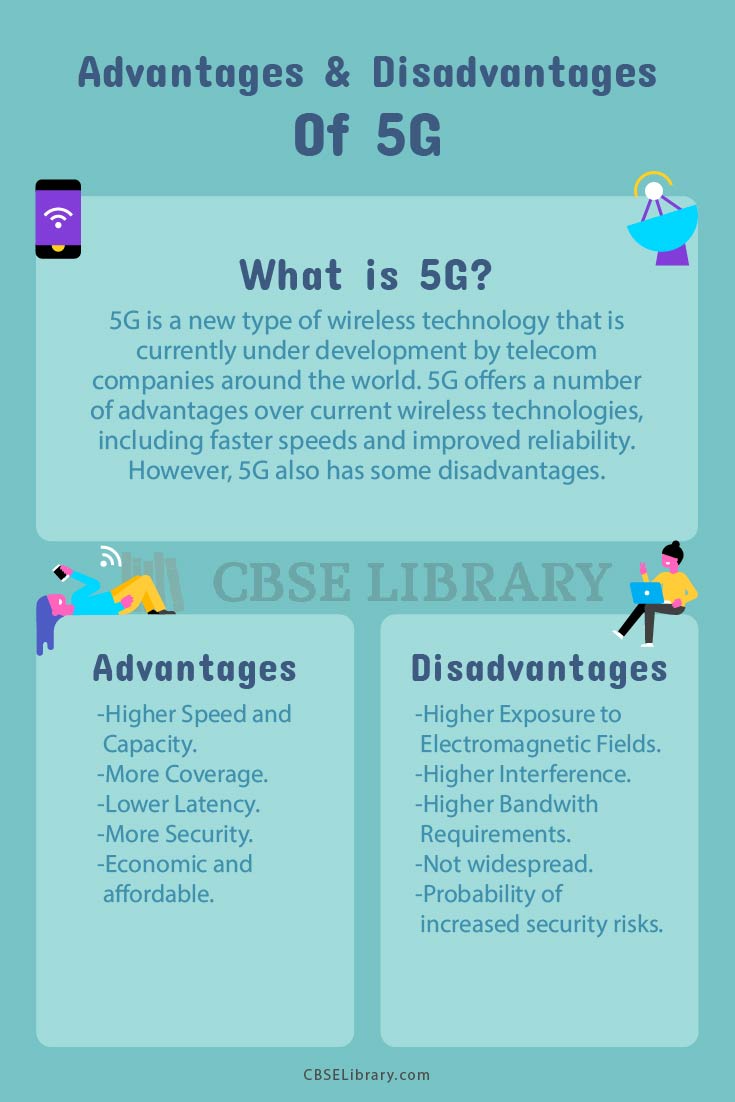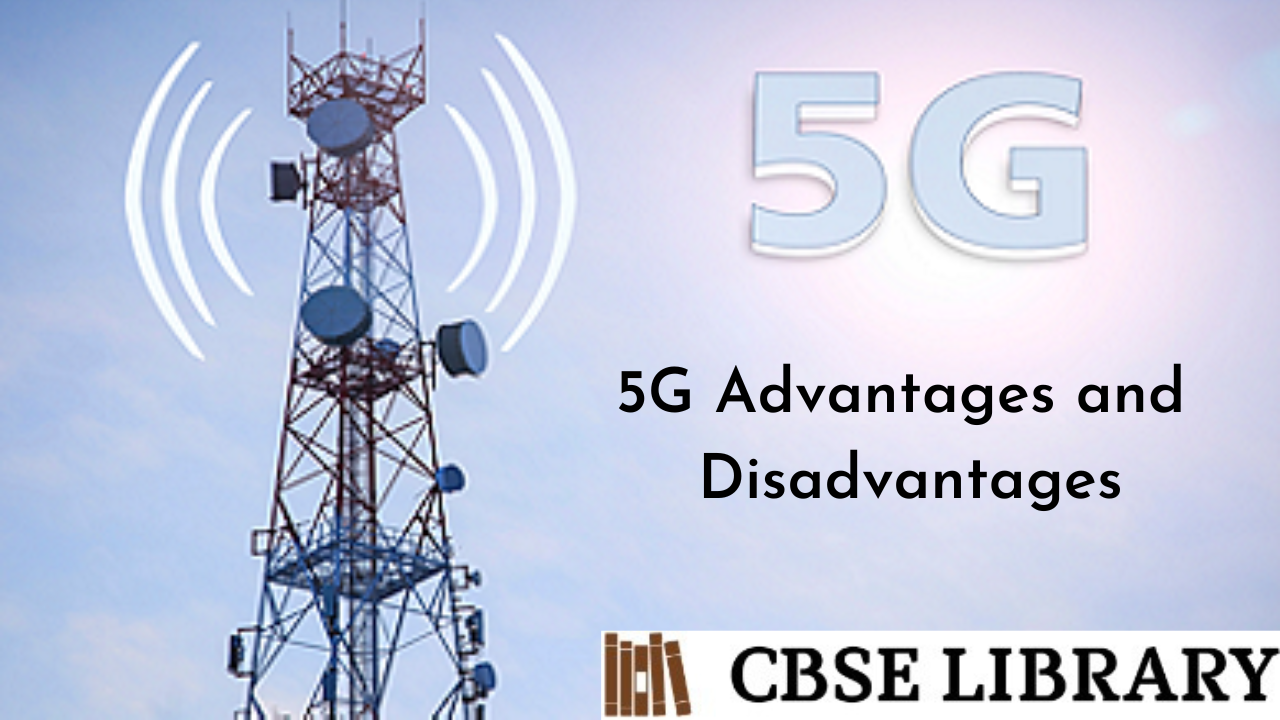5G Advantages And Disadvantages: 5G is quickly becoming one of the most important telecommunications technologies in the world. 5G offers a number of advantages over 4G LTE, the current standard for wireless communication. Chief among these advantages is faster download and upload speeds, which are critical for applications like downloading large files and streaming videos. In addition, 5G offers greater bandwidth capacity and improved reliability. It is also more energy-efficient than 4G LTE, which makes it ideal for use in areas with poor cell coverage. As the world moves towards a 5G network, it’s important to be aware of the advantages and disadvantages of this new technology. In this article, we’ll explore some of the key reasons why businesses and individuals should consider adopting 5G and what challenges they may face along the way.
Students can also find more Advantages and Disadvantages articles on events, persons, sports, technology, and many more.
What is 5G? Advantages and Disadvantages of 5G Technology 2022
5G is a new type of wireless technology that is currently under development by telecom companies around the world. 5G offers a number of advantages over current wireless technologies, including faster speeds and improved reliability. However, 5G also has some disadvantages. For example, 5G signals are thought to be more harmful to your health than current signals, though research for the same is inconclusive. Additionally, 5G networks are likely to be more expensive than traditional networks. As with all new technologies, it is important to weigh the benefits and drawbacks of 5G before making a decision.
- Advantages of 5G
- Disadvantages of 5G
- Comparison Table for Advantages and Disadvantages of 5G
- Conclusion on 5G – Advantages And Disadvantages
- FAQs on Advantages And Disadvantages of 5G
Advantages of 5G
5G networks have many benefits that businesses and consumers should consider. Here are some of the advantages of 5G networks:
- Increased Speed and Capacity: 5G networks are much faster than current 4G networks. This means that you can download large files more quickly and stream videos with better quality.
- Increased Coverage: 5G networks can cover a much larger area than 4G networks. This means that you will be able to access more content and services in your area.
- Reduced Latency: 5G networks have low latency, which means that you will be able to connect with other devices and systems more quickly.
- Increased Security: 5G networks are more secure than 4G networks. This means that your data will be protected from cyber-attacks.
- Reduced Costs: 5G networks are less expensive than 4G networks. This means that you will be able to save money on your telecommunications bills
Disadvantages of 5G
While 5G networks are touted as having many advantages, there are some disadvantages to be aware of. Here are five of the biggest:
- Increased Exposure to Electromagnetic Fields: 5G networks generate a much higher level of electromagnetic fields than current networks. This can increase your exposure to radiation, which may harm your health, but evidence for the same is not conclusive.
- Increased Interference: 5G networks are notorious for causing interference with other devices and services. This can cause problems for both you and your neighbours.
- Increased Bandwith Requirements: 5G networks are capable of transmitting data at much higher rates than current networks. This can cause problems for devices that cannot keep up with the increased bandwidth requirements.
- Increased Costs: 5G networks will require significant investment in infrastructure, which will likely increase the costs of using them.
- Increased Security Risks: Because 5G networks use more sophisticated technology, they are more susceptible to cyberattacks and data breaches. This increases the risk of identity theft and other financial scams.
Comparison Table for Advantages and Disadvantages of 5G
Following are the advantages and disadvantages of 5G :
| Advantages | Disadvantages |
| Higher Speed and Capacity | Higher Exposure to Electromagnetic Fields |
| More Coverage | Higher Interference |
| Lower Latency | Higher Bandwith Requirements |
| More Security | Not widespread |
| Economic and affordable | Probability of increased security risks |

Conclusion on 5G – Advantages And Disadvantages
5G has the potential to revolutionize many industries, but there are also some clear advantages and disadvantages associated with its use. Here are a few of the key points to consider:
Advantages:
- Improved mobility and connectivity for consumers and businesses
- Faster speeds, less latency, and enhanced security
- Reduced energy consumption and emissions
- Potential to increase innovation in many industries
Disadvantages:
- Increased demands on infrastructure, including more antennas and wider coverage
- Higher initial costs
- Potential for interference from other wireless networks
- Lack of support for existing devices.
FAQs on Advantages And Disadvantages of 5G
Question 1.
What is 5G?
Answer:
5G is a new wireless technology that will allow for faster speeds and more data transfers than current wireless systems. It is currently being developed by telecommunications companies around the world and will be used in a variety of applications, including but not limited to internet access, medical devices, vehicle communication, and smart cities.
Question 2.
What are the advantages of 5G?
Answer:
5G is a new wireless technology that will allow for faster data speeds and improved communication. There are many advantages to this new technology, including the ability to connect more devices to the internet simultaneously, reduced lag time in online gaming, and quicker response times when streaming video or accessing other online services. 5G is still in its early stages of development, but the potential benefits are immense and could result in major improvements for many people’s lives.
Question 3.
What are the disadvantages of 5G?
Answer:
There are many potential disadvantages of 5G. First, it could cause more interference than other types of wireless technology. This could lead to decreased quality of service and increased costs for businesses and consumers. Second, 5G could be harmful to human health. It may increase the risk of cancer, brain tumors, and other health issues. Finally, 5G could have a significant impact on the environment. It could cause more pollution and damage the ecosystem.
Question 4.
How is 5G different from 4G?
Answer:
4G LTE is the current version of cellular phone service. 4G LTE allows for faster data speeds than 3G and 2G services. 5G is a next-generation cellular technology that offers even faster data speeds. However, there are some key differences between 4G LTE and 5G. For one, 5G uses higher frequency bands than 4G LTE. This makes it better at transmitting signals through walls and barriers. 5G also has the potential to be more efficient when it comes to moving data between devices.
Question 5.
Why is 5G so important?
Answer:
5G will be one of the most important technologies in the next few years. Here’s why:
- 5G will enable faster and more efficient connections between devices.
- 5G will enable new smart city applications that can improve public safety, infrastructure management, and more.
- 5G will enable new ways to communicate and interact with people and objects remotely
- 5G will enable new ways to connect businesses and consumers.
